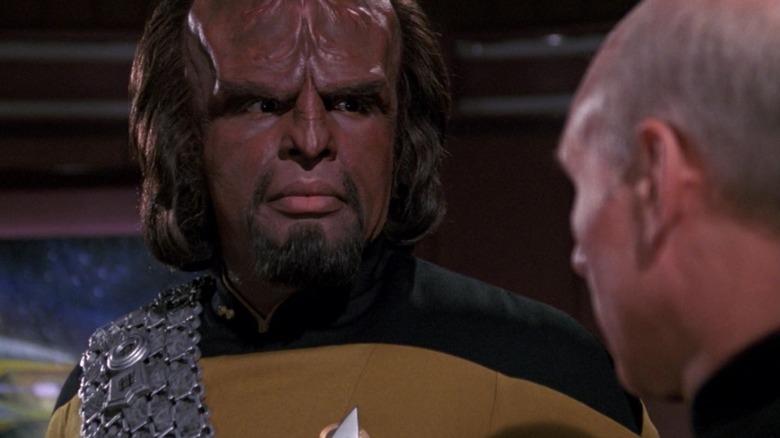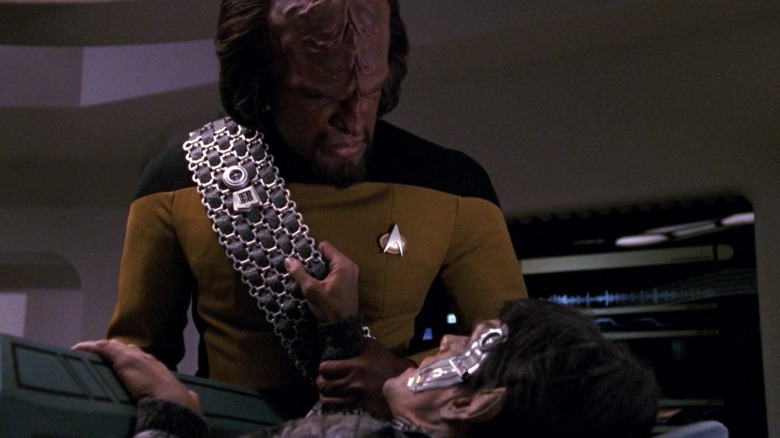Michael Dorn Disagreed With One Worf Decision In Star Trek: The Next Generation
In the "Star Trek: The Next Generation" episode "The Enemy" (November 6, 1989), the U.S.S. Enterprise-D rushes to the aid of a downed Romulan vessel on a stormy, radioactive planet called Galorndon Core. Dr. Crusher (Gates McFadden) manages to rescue an injured Romulan officer, and keeps his condition steady back on board the ship. It seems, however, that the Romulan suffered a deep neurological injury that she won't be able to treat unless she gets some Romulan blood she can transfuse. Sadly, the Federation and the Romulans are still deeply at odds, and there is no Romulan blood on hand.
Dr. Crusher does find that she can, with some clever organic chemistry, alter the blood of a Klingon to serve as a reasonable facsimile, and there is one Klingon, Worf (Michael Dorn), on board. All she needs to do is get a blood sample from him, extrapolate the appropriate ribosomes, and save her patient's life. The only problem is that Worf refuses to give a sample. Worf understands that if he refuses to help, the Romulan will die, but he doesn't much care. Romulans killed his family, and they are a sworn enemy of Starfleet, so Worf feels no need to save them. He feels giving his blood to save the life of an enemy is a violation of his principles. No one can order Worf to give his blood, so Crusher and Captain Picard (Patrick Stewart) have to convince him to swallow his pride.
But Worf's pride is unswallowable. Before the episode ends, the Romulan dies. Worf expresses no regret. Dr. Crusher is horrified.
Dorn talked about "The Enemy" in the oral history book "The Fifty-Year Mission: The Next 25 Years: From The Next Generation to J. J. Abrams," edited by Mark A. Altman and Edward Gross, and the actor expressed some regret over Worf's decision. He understood that Worf was informed largely by his pride, but in "The Enemy," Dorn felt his character was stubborn to the point of murder.
Dorn and the producers disagreed over 'The Enemy'
Worf, for any non-Trekkies reading, was raised on Earth by human parents after Romulans killed his biological father. Worf has been living among humans most of his life, but had always been determined to live by a Klingon code of ethics. He has remained humorless and stern his whole life, surrounding himself with the Klingon accouterments he missed in his youth. Worf, if you'll forgive me, clings on to his culture. It grounds him, it makes him who he is. Hence, when it came time to express Klingon ethics — which are very different from human ethics — the show's producers felt Worf should remain as Klingon as possible.
Dorn didn't like that as, in the case of "The Enemy," it made Worf look bad. Dorn felt that Worf should have adopted a more human viewpoint. The producers of "NextGen," however, felt that there should always be something of an ethical divide, causing more personal conflict for the series. More conflict equals more drama. Dorn recalls expressing his objections, saying:
"I called the producers and said I didn't agree. I thought [giving blood] was the honorable thing to do. I thought people would look at [Worf] as a murderer. The producers felt that Worf was getting to be too Human ... just a guy with a big head. When the opportunity came for them to show that Worf was not Human, that he is not bound by the same morals as we are, they felt it was a wonderful opportunity."
After Worf denied his blood to the dying Romulan, nothing was achieved. No one complimented Worf for sticking up for himself, and both Dr. Crusher and Captain Picard expressed their dismay and disappointment that Worf would help save a life. But that made the story more tragic and, hence, more satisfying. Also, it's important to remind viewers that the nonhuman characters on "Star Trek" don't share the same principles as the humans, and that ethics must always be challenged and discussed.
It's what makes "Star Trek" "Star Trek."

